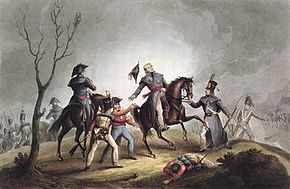Battle of Elviña
| Battle of Corunna | |||||||
|---|---|---|---|---|---|---|---|
| Part of the Peninsular War | |||||||
 Death of Sir John Moore at the Battle of Corunna derived from an engraving by Thomas Sutherland and aquatint by William Heath |
|||||||
|
|||||||
| Belligerents | |||||||
|
|
|
||||||
| Commanders and leaders | |||||||
|
|
|
||||||
| Strength | |||||||
| 16,000: 15,000 infantry 9 to 12 guns |
16,000: 12,000 infantry 3,200 cavalry 20 guns |
||||||
| Casualties and losses | |||||||
| 900 dead or wounded 300 sick abandoned |
600 to 700 dead or wounded 200 to 300 prisoners |
||||||
The Battle of Corunna (or A Coruña, La Corunna, La Coruña, Elviña or La Corogne) took place on 16 January 1809, when a French corps under Marshal of the Empire Nicolas Jean de Dieu Soult attacked a British army under Lieutenant-General Sir John Moore. The battle took place amidst the Peninsular War, which was a part of the wider Napoleonic Wars. It was a result of a French campaign, led by Napoleon, which had defeated the Spanish armies and caused the British army to withdraw to the coast following an unsuccessful attempt by Moore to attack Soult's corps and divert the French army.
Doggedly pursued by the French under Soult, the British made a retreat across northern Spain while their rearguard fought off repeated French attacks. Both armies suffered extremely from the harsh winter conditions. Much of the British army, excluding the elite Light Brigade under Robert Craufurd, suffered from a loss of order and discipline during the retreat. When the British eventually reached the port of Corunna on the northern coast of Galicia in Spain a few days ahead of the French they found their transport ships had not arrived. The fleet arrived after a couple of days and the British were in the midst of embarking when the French forces marched up and forced the British to fight a battle before they could depart for England.
In the resulting action, the British repulsed the French assault and completed their embarkation, saving their army from destruction but leaving the port cities of Corunna and Ferrol, as well as northern Spain, to be captured and occupied by the French. During the battle, Sir John Moore, the British commander, was mortally wounded, dying after hearing all the French attacks had been repulsed.
In early October 1808, following the scandal in Britain over the Convention of Sintra and the recall of the generals Dalrymple, Burrard and Wellesley, Sir John Moore took command of the 30,000 man British force in Portugal. In addition, Sir David Baird in command of an expedition of reinforcements out of Falmouth consisting of 150 transports carrying between 12,000 and 13,000 men, convoyed by H.M.S. Louie, Amelia and Champion, entered Corunna Harbour on the 13 October. By November 1808 the British army, led by Moore, advanced into Spain with orders to assist the Spanish armies in their struggle against the invading forces of Napoleon.
...
Wikipedia
